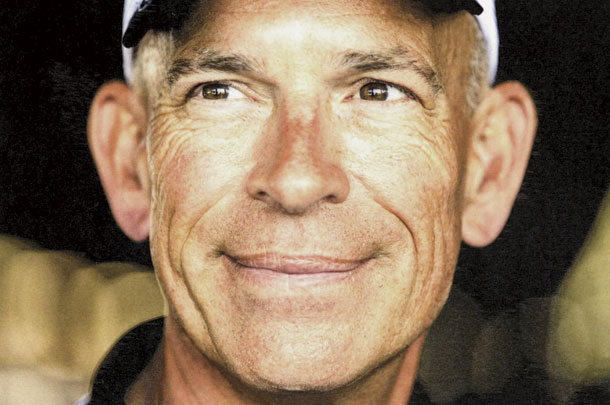In late fall 2016, the Door County Peninsula area experienced a “brown water event” that caught attention from national news outlets. Though this was the first reported incidence in the past four years of tap water with the faint color and smell of cow manure, it was enough to cause concern among citizens and catch media attention. In an area where cows outnumber people, blame was quickly placed on the local dairy farms.
Instead of denying cow manure as a potential cause, a group of dairy farmers boldly stepped up to take on the social responsibility of investigating the origin of the brown water and pledging to protect groundwater quality. Through these efforts, they’ve bridged a gap of communication with the local community.
How does a brown water event happen?

As dairy farmer and veterinarian Dr. Don Niles from Casco, Wisconsin, explains, turning on the faucet to a flow of foul-smelling, tan-colored tap water used to be a more common occurrence in the Door and Kewaunee county area decades ago.
The dense dairy region’s shallow soils have been providing cattle feed for well over a century, but in certain areas, they lack the depth to effectively break down pathogens and nutrients applied to the soil surface. Fractured bedrock often lies underneath that thin layer of soil, along with sinkholes, and these cracks can provide a direct conduit for something on the soil surface to seep down into the groundwater supply. In the worst-case scenarios, this can affect rural residential wells.
However, agriculture sources are not the only culprit. Faulty septic tanks and outdated wells can be to blame for brown water too, and it can be difficult to determine the true source of contamination.
Activists and the EPA
In the past, when these brown water events occurred, each party was quick to call out the other’s liability, but the issue remained local. In 2014, a citizens’ activist group with an anti-agriculture agenda elevated their concern, petitioning the EPA to intervene under the emergency powers of the Safe Drinking Water Act. Soon after, the No. 7 dairy county in the U.S. had a target on its back. Helicopters were seen flying over manure pits and monitoring fields for runoff on rainy days, looking for anything out of compliance. While tremendous resources were expended to monitor dairy farms in this area, no practices calling for fines were observed.
Maintaining the social license to dairy
Niles recalls what is was like to be under that EPA scrutiny. He is a part-owner of 20,000 cows among three sites, two of which are located in Kewaunee County and the other in the state of Kansas. He recognizes the future of dairy farming in Wisconsin relies on earning the favor of citizens and lawmakers, and standing accountable is a large part of that.
“We [the dairy community] needed to accept and acknowledge our share of the problem. We are part – but not the whole – cause of the water contamination problem,” Niles says. “We take on the responsibility to protect the land, animals and our neighbors … that’s our job.”
This commitment to protecting lakes and streams, and ensuring safe drinking water, prompted Niles and several of his neighbors to form Peninsula Pride Farms three years ago. The group defined its focus to concentrate on surface water runoff, groundwater nitrate contamination and groundwater pathogen contamination.
The farmer-led, non-profit group includes 46 dairy and crop farmer members. With members’ herd sizes ranging from 60 to 6,000 cows, it represents 50 percent of the cattle population and half the tillable acreage in Door and Kewaunee counties. Each farmer-member pledges to hold themselves to a higher standard than regulations require. This includes participating in independent analysis of nutrient management plans, soil mapping and evaluations of soil health, application practices and cover crops, followed by steps to improve water quality impacts.
Niles says Peninsula Pride Farms has changed conversations for the better by committing to the improvement of farming practices. Members are empowered to share their experiences and learn from each other. “None of us can do this by ourselves,” he adds.
Funding for Peninsula Pride Farms comes from memberships, donations, local businesses and matching grants, along with a unique relationship with the Nature Conservancy. The worldwide, non-profit environmental group dedicated to land and water conservation recognizes and supports Peninsula Pride Farms’ positive impacts and measurable results, such as reducing tons of phosphorus from entering surface water.
While environmental stewardship is the impetus behind Peninsula Pride Farms, its purpose does not end there. Niles sees this as a bridge for engaging with the local community to tell the story of the family farms of all sizes that make up the group, their dedication to animal care and their concern for protecting their neighbors. Communicating these messages is a step toward gaining the favor of the non-farming public and connecting over shared ethics and responsibilities, and Niles believes this is critical for the future of dairy farming in his area.
“Our vision is for the Door County Peninsula to have both safe, clean water and a thriving ag community,” Niles concludes. “That purpose makes sense to people. They don’t want the farms to be gone; they just don’t want the farms messing up their personal property.”
Through transparency, collaboration, outreach and continuous improvement, Niles and the other Peninsula Pride Farms members plan to continue holding themselves to a higher standard and assuming responsibility and accountability for their vital role in protecting and improving water quality. ![]()
PHOTO 1: Peninsula Pride Farms members learn about soil health from University of Wisconsin Extension agent Jamie Patton during a field day.
PHOTO 2: Don Niles is a veterinarian and owner in two dairies located near Casco, Wisconsin. He and fellow dairy farmers in the area formed Peninsula Pride Farms to collaborate and learn from each other as they hold themselves to a higher standard of water quality protection, above and beyond what regulations require. Photos courtesy of Peninsula Pride Farms.
Niles presented “Perspectives on a dairy industry under environmental and social scrutiny” during the 2018 Dairy Cattle Reproduction Council (DCRC) annual meeting. He is a veterinarian and partner in Dairy Dreams and Pagel’s Ponderosa dairies in Kewaunee County, Wisconsin, as well as High Plains Ponderosa Dairy in Kansas.






